148 scholarly books by Karolinum Press and 9
start with E
148 scholarly books by Karolinum Press and 9
148 scholarly books by Karolinum Press
9 start with E start with E
9 start with E start with E

Ear
Jan Procházka
Karolinum Press, 2022
A paranoid thriller of life under surveillance in Soviet Czechoslovakia.
A deputy minister in the Communist Party of Czechoslovakia, Ludvík enjoys all the luxuries that success in the party affords him, but he must be careful: he’s under no illusions about the secret police bugging his apartment. Luckily, he and his wife, Anna, know where the bug is and where they can safely converse. However, any comfort they feel disappears the evening they attend an official party, where they learn that Ludvík’s boss has just been arrested after presenting a report written by Ludvík himself. Is Ludvík next? Back home after the party, the couple must get past unresolved marital tensions to get rid of absolutely anything that could incriminate them—all while contending with the strange men outside their apartment and the bug inside.
Penned under the oppressive watch of Soviet authorities in 1960s Czechoslovakia—but touching on still-current themes of surveillance and paranoia—this cinematic thriller is as tense and timely as ever. A promising Party member who became persona non grata after the Soviet occupation of Czechoslovakia, author Jan Procházka knew firsthand the gnawing terror of life in a surveillance state: after his death in 1971, the new tenants of his apartment discovered twelve hidden listening devices. As Ear makes terrifyingly clear, the most frightening horror stories are the ones closest to everyday reality.
A deputy minister in the Communist Party of Czechoslovakia, Ludvík enjoys all the luxuries that success in the party affords him, but he must be careful: he’s under no illusions about the secret police bugging his apartment. Luckily, he and his wife, Anna, know where the bug is and where they can safely converse. However, any comfort they feel disappears the evening they attend an official party, where they learn that Ludvík’s boss has just been arrested after presenting a report written by Ludvík himself. Is Ludvík next? Back home after the party, the couple must get past unresolved marital tensions to get rid of absolutely anything that could incriminate them—all while contending with the strange men outside their apartment and the bug inside.
Penned under the oppressive watch of Soviet authorities in 1960s Czechoslovakia—but touching on still-current themes of surveillance and paranoia—this cinematic thriller is as tense and timely as ever. A promising Party member who became persona non grata after the Soviet occupation of Czechoslovakia, author Jan Procházka knew firsthand the gnawing terror of life in a surveillance state: after his death in 1971, the new tenants of his apartment discovered twelve hidden listening devices. As Ear makes terrifyingly clear, the most frightening horror stories are the ones closest to everyday reality.
[more]

The Economic Rise of the Czech Lands 1
From the 1750s to the End of World War I
Edited by Zdenek Jindra and Ivan Jakubec
Karolinum Press, 2019
This first of a two-part examination of the economic development of the Czech lands deals with the period from the mid-eighteenth century (the accession of Maria Theresa to the Austrian throne) to the end of the World War I. In this key period of industrialization, economic, social, political, legal, and cultural changes intersected. Featuring chapters by leading Czech experts in the economic development and social history of the Czech lands, this broad study explores the multifaceted conditions and outcomes of modernization in Central Europe—from social development to industry, agriculture, banking, transport, and infrastructure—as well as offers valuable comparisons with relevant regions of the Habsburg Empire and Western Europe. Also included are an extensive bibliography and indexes and charts of the Austro-Hungarian monarchy, the scope of the authority of the chambers of trade and industry, the development of leading engineering companies, and various maps, including of the Czech railway network.
[more]
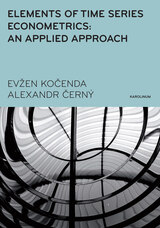
Elements of Time Series Econometrics
An Applied Approach - Third Edition
Evzen Kocenda and Alexandr Cerný
Karolinum Press, 2017
A time series is a sequence of numbers collected at regular intervals over a period of time. Designed with emphasis on the practical application of theoretical tools, Elements of Time Series Econometrics is an approachable guide for the econometric analysis of time series. The text is divided into five major sections. The first section, “The Nature of Time Series,” gives an introduction to time series analysis. The next section, “Difference Equations,” describes briefly the theory of difference equations, with an emphasis on results that are important for time series econometrics. The third section, “Univariate Time Series,” presents the methods commonly used in univariate time series analysis, the analysis of time series of a single variable. The fourth section, “Multiple Time Series,” deals with time series models of multiple interrelated variables. The final section, new to this edition, is “Panel Data and Unit Root Tests” and deals with methods known as panel unit root tests that are relevant to issues of convergence. Appendices contain an introduction to simulation techniques and statistical tables.
[more]
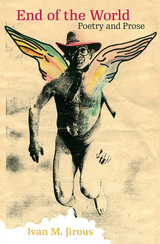
End of the World
Poetry and Prose
Ivan M. Jirous
Karolinum Press, 2020
Sometimes called the Czech Bukowski, and more widely known by the epithet “Magor” (which translates roughly to “fool” or “madman”), Ivan Jirous was one of the most significant figures in the Czechoslovak cultural underground of the 1960s through the '80s. Although trained as an art historian and famed for his poetry, Jirous was convinced that it was actually rock and roll music that held the greatest potential to enact change under the repressive regime of communist Czechoslovakia. He designated himself as the artistic director of the dissident rock band The Plastic People of the Universe, legendary for psychedelic music that was heavily influenced by nonconformist Western acts like Frank Zappa and The Velvet Underground. Alongside other figures from the musical underground, Jirous was arrested in 1976—the second of five prison sentences he would serve for his dissent—which helped bring about the landmark civil rights initiative known as Charter 77. In the wake of 1989’s Velvet Revolution, Váсlav Havel—the first president of the Czech Republic—was to say that Jirous and his unwavering commitment to liberation played “no small part” in casting off the yoke of Soviet oppression.
End of the World is the first major collection in English of the works of this legendary Czech “madman.” Although nicknamed for his aggressive and rebellious behavior, Jirous’s writing reveal a refined, sophisticated, and even tender sensibility. Translated in part by Paul Wilson, an original member of the Plastic People, the book gathers his poems and letters from prison, as well as his book-length prose work, The True Story of the Plastic People, alongside critical essays on Jirous’s life and work. End of the World is an ideal introduction to the raucous writer who playwright Tom Stoppard referred to as one of the most interesting personalities in modern Czech history.
End of the World is the first major collection in English of the works of this legendary Czech “madman.” Although nicknamed for his aggressive and rebellious behavior, Jirous’s writing reveal a refined, sophisticated, and even tender sensibility. Translated in part by Paul Wilson, an original member of the Plastic People, the book gathers his poems and letters from prison, as well as his book-length prose work, The True Story of the Plastic People, alongside critical essays on Jirous’s life and work. End of the World is an ideal introduction to the raucous writer who playwright Tom Stoppard referred to as one of the most interesting personalities in modern Czech history.
[more]
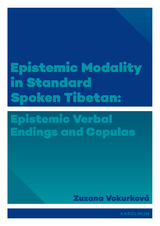
Epistemic Modality in Standard Spoken Tibetan
Epistemic Verbal Endings and Copulas
Zuzana Vokurková
Karolinum Press, 2017
The Sino-Tibetan language family is the second largest in the world, and standard Tibetan is the most widely spoken language in the Tibetic group. A comprehensive introduction to epistemicity in standard spoken Tibetan, this book examines the grammatical expression of a variety of epistemic modalities—rather, the myriad ways in which a speaker indicates their confidence in the knowledge on which their statement is based—through numerous examples of epistemic types. It elucidates the complex system of epistemic verbal endings and epistemic copulas, or connecting words, employed in the spoken language, analyzing them from semantic, syntactic, and pragmatic viewpoints.
[more]
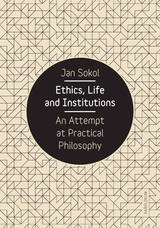
Ethics, Life and Institutions
An Attempt at Practical Philosophy
Jan Sokol
Karolinum Press, 2017
General complaints about moral decay, however frequent and even justified they may be, are of little use. This book does not complain; it acts. Jan Sokol’s Ethics, Life and Institutions applies our ever improving knowledge in various fields to questions of morality in an effort to enhance our ability to discern different moral phenomena and to discuss them more precisely.
With few exceptions, moral philosophy considers the acting person to be an autonomous, independent individual pursuing his or her own happiness. But in the context of social institutions—for example, in workplaces—it is often an organization’s goals, not an individual’s, that take precedence. In complex networks of organizations, morals take a different shape. Divided into three parts, this book begins by exploring basic notions such as freedom, life, responsibility, and justice, and their relationship to practical philosophy; looks to the main schools of Western thought in the search for a common moral foundation; and reintroduces the forgotten idea of biological and cultural heritage—an idea that could prove fundamental in addressing our responsibility not only to human lives, but also to the natural world. In a closing analysis, Sokol brings all of these moral concepts to bear on problems connected to the growing complexity of institutions, offering hope for a practical philosophy for the modern world.
With few exceptions, moral philosophy considers the acting person to be an autonomous, independent individual pursuing his or her own happiness. But in the context of social institutions—for example, in workplaces—it is often an organization’s goals, not an individual’s, that take precedence. In complex networks of organizations, morals take a different shape. Divided into three parts, this book begins by exploring basic notions such as freedom, life, responsibility, and justice, and their relationship to practical philosophy; looks to the main schools of Western thought in the search for a common moral foundation; and reintroduces the forgotten idea of biological and cultural heritage—an idea that could prove fundamental in addressing our responsibility not only to human lives, but also to the natural world. In a closing analysis, Sokol brings all of these moral concepts to bear on problems connected to the growing complexity of institutions, offering hope for a practical philosophy for the modern world.
[more]

Everyday Spooks
Karel Michal
Karolinum Press, 2008
Prague-born Karel Michal (1932–84) lived a significant part of his adult life under Czechoslovakia’s oppressive communist regime. Prevented from studying at the university as a young man, he fruitlessly cycled through a number of professions before finally turning to writing in the early 1960s. Michal’s works—which include detective fiction, historical novels, short stories, and screenplays—offer a Kafkaesque perspective on the mechanism of the absurd and argue for substantial reinterpretation of the concept of ordinary life under a totalitarian regime.
With Everyday Spooks, Michal presents an unforgettable assortment of fantastic creatures that inhabit his strange vision of everyday reality in ’50s and ’60s communist Czechoslovakia. Translated from the Czech by David Short and complemented with suitably eerie illustrations by Dagmar Hamsíková, this collection of seven short stories describes bizarre encounters where the past melts into the present, ordinary people meet comic and anxious figures and interact with ghosts, and mundane speech drifts repeatedly into absurdity.
[more]
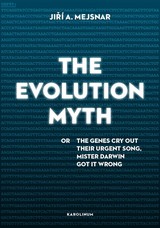
The Evolution Myth
or, The Genes Cry Out Their Urgent Song, Mister Darwin Got It Wrong
Jirí A. Mejsnar
Karolinum Press, 2014
The origins of life, species, and man continue to interest scientists and stir debate among the general public more than one hundred and fifty years after Charles Darwin published On the Origin of Species. The Evolution Myth approaches the subject with two intertwined objectives. Jirí A. Mejsnar first sets out to convey the advances made in cosmology, molecular biology, genetics, and other sciences that have enabled us to change our views on our origins and our relationship with the universe. Scientific advances now allow us to calculate, for example, the age of the universe, the period in which biblical Eve lived, and, with good justification, to reconsider the possibility that the Neanderthals and primates might be our ancestors.
The author’s second objective is to use biology to explain why evolution cannot have taken place in the way that is most commonly assumed. Mejsnar builds his case around gene stability and on the sophisticated modern techniques for gene manipulation, the complexity of which make these modified genes inaccessible to nature. Development of life on Earth is a discontinuous, saltatory progression that results in stages following from preceding latent periods in which new forms suddenly appear and possess new types of genome. This, the author argues, is difficult to reconcile with the hypothesis of continuous biological evolution based on the natural selection of random variations.
Taking a new approach to a much-debated subject, Mejsnar distills complex information into a readable style. The result is a book that is sure to get readers talking.
The author’s second objective is to use biology to explain why evolution cannot have taken place in the way that is most commonly assumed. Mejsnar builds his case around gene stability and on the sophisticated modern techniques for gene manipulation, the complexity of which make these modified genes inaccessible to nature. Development of life on Earth is a discontinuous, saltatory progression that results in stages following from preceding latent periods in which new forms suddenly appear and possess new types of genome. This, the author argues, is difficult to reconcile with the hypothesis of continuous biological evolution based on the natural selection of random variations.
Taking a new approach to a much-debated subject, Mejsnar distills complex information into a readable style. The result is a book that is sure to get readers talking.
[more]
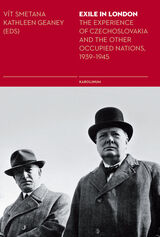
Exile in London
The Experience of Czechoslovakia and the Other Occupied Nations, 1939–1945
Edited by Vít Smetana and Kathleen Brenda Geaney
Karolinum Press, 2018
During World War II, London experienced not just the Blitz and the arrival of continental refugees, but also an influx of displaced foreign governments. Drawing together renowned historians from nine countries—the United Kingdom, Germany, the Netherlands, Belgium, Poland, the former Yugoslavia, the Czech Republic, and Slovakia—this book explores life in exile as experienced by the governments of Czechoslovakia and other occupied nations who found refuge in the British capital. Through new archival research and fresh historical interpretations, chapters delve into common characteristics and differences in the origin and structure of the individual governments-in-exile in an attempt to explain how they dealt with pressing social and economic problems at home while abroad; how they were able to influence crucial Allied diplomatic negotiations; the relative importance of armies, strategic commodities, and equipment that particular governments-in-exile were able to offer to the allied war effort; important wartime propaganda; and early preparations for addressing postwar minority issues.
[more]
READERS
Browse our collection.
PUBLISHERS
See BiblioVault's publisher services.
STUDENT SERVICES
Files for college accessibility offices.
UChicago Accessibility Resources
home | accessibility | search | about | contact us
BiblioVault ® 2001 - 2024
The University of Chicago Press









